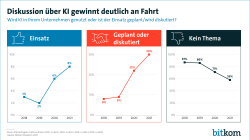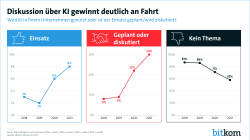Companies‘ AI uptake is progressing steadily
Berlin, 21 April 2021 - Artificial intelligence is seen as a crucial future technology in the German economy. More and more companies see AI as an opportunity for their own business. Accordingly, the proportion of those using AI applications is increasing, and every fourth company (24 percent) is planning to invest in AI. These are the results of a representative survey of more than 600 companies from all sectors commissioned by the digital association Bitkom, which was presented today. According to the survey, more than two thirds (69 percent) of companies say that AI is the most important technology of the future. Only around one in four companies (26 percent), on the other hand, believe that AI is overestimated and just a hype. More and more companies see advantages for themselves in AI. For 62 percent, artificial intelligence offers opportunities for their own business, compared to only 55 percent a year ago. The proportion of those who mainly see risks has fallen from 28 to 23 percent. Every ninth company (11 percent, 2020: 14 percent) believes that AI has no influence on their business. However, the number of companies using AI is not increasing at the same pace. Currently, AI applications are used in 8 percent of companies, compared to 6 percent a year ago. The share of companies planning or discussing its use has risen more sharply, from 22 to 30 percent. The proportion of companies which do not consider AI at all has also fallen - from 71 percent in 2020 to 59 percent now. "From autonomous driving to medical diagnosis, from customer query support to quality control in production: the potential uses of AI run through all industries. The fact that AI use is increasingly seen as both a must and an opportunity in the German economy is a good sign. Now it must be a matter of bringing AI into corporate practice with even more momentum," says Bitkom President Achim Berg. "Anyone who has recognised how important artificial intelligence is already today and will be in the future in particular should invest now."
Lack of money, expertise and time for AI
Companies that are not currently involved with AI cite a lack of personnel (49 percent), a lack of time (47 percent) and a lack of financial resources (46 percent) as the most important reasons for this. 4 out of 10 companies (44 percent) first want to wait and see where the use of AI proves useful in other companies. 40 percent do not have the necessary data for the use of AI, 38 percent feel unsettled by legal uncertainties. Only rarely does the use fail due to a lack of use cases in the own company (17 percent) and suitable AI tools (13 percent) or because the companies are currently occupied with other future technologies (4 percent). "No people, no money, no time - these should not be reasons against AI. The future-oriented allocation of resources is a top management task. Artificial intelligence must be on the agenda of every company," says Berg.
Companies see a wide range of benefits from AI
Basically, the companies see a wide range of benefits from AI, for example through the optimisation of processes. For example, 44 percent expect faster and more precise problem analyses through AI, 35 per cent expect accelerated processes and 30 per cent expect lower resource consumption, which would also benefit the environment. AI also offers many advantages with regard to employees. 39 percent expect to avoid human errors in their daily work, 31 percent hope to gain expert knowledge through AI systems that would otherwise not be available and 28 percent assume that employees will be able to concentrate on more important tasks thanks to AI support. And finally, AI will also change the business model in many cases. 21 percent expect the improvement of existing products and services, 17 percent even expect completely new offers thanks to AI. On the other hand, only one in ten companies (10 per cent) wants to save costs in this way. "There is no one reason to use artificial intelligence in the company. AI is a basic technology that opens up a multitude of new possibilities," says Berg.
AI is already used in numerous business areas
Those companies that already use AI most frequently use the corresponding technologies for personalised advertising (71 percent). 64 percent use AI to improve internal processes in production and maintenance, 63 percent in customer service, for example in the automated answering of queries. Around one in two companies uses AI to analyse customer behaviour in sales (53 percent) or across departments for texts such as reports or translations (50 percent). In accounting, 44 percent use AI, for example for automated bookings, 43 percent rely on AI for management support, for example in the development of strategies. AI-based tools have been introduced by 39 per cent in their IT department, 35 per cent in logistics, for example for better route planning. AI is used less frequently in research and development (25 per cent) or in the HR department (21 per cent), for example to pre-select applicants. 18 percent use AI to detect risks in the company, for example in controlling. Almost no one (1 per cent) uses AI applications in the legal and tax departments.
Small companies in particular are hesitant about AI investments
Companies are reluctant to invest in artificial intelligence in the current year. Just 8 percent of all companies want to invest in AI in 2021, while 16 percent have set their sights on doing so in 2022 or the following years. 16 percent have already invested in AI technology in the past. But more than half (57 percent) have not yet spent any money on AI - and do not plan to do so in the future. Small companies are significantly more reluctant than large ones. In 2021, only 6 percent of companies with 20 to 99 employees plan to invest in AI, compared to 15 percent of companies with 100 to 499 employees and more than one in five of large companies (23 percent of companies with 500 to 1,999 employees, 21 percent with 2,000 or more employees). At the same time, only 14 per cent of smaller companies have invested in AI in the past, compared to 23 per cent of those with 100 to 499 employees, 33 per cent of larger companies with 500 to 1,999 employees and as many as 41 per cent of companies with 2,000 or more employees. "The Corona pandemic is certainly contributing to the current reluctance to invest in AI. At the same time, we are all seeing that companies that have already invested in their digitalisation in the past are coming through the current crisis better. This should be understood as a mandate to all those who are currently still reluctant to invest in AI," said Berg.
Only in large companies do in-house teams drive AI deployment forward
In two-thirds (67 per cent) of the companies that already use AI, are planning to use it or are at least discussing it, the IT department is driving AI use. In one in five (20 percent), it is independent AI teams or an AI department, in 15 percent dedicated individuals, in 14 percent interdisciplinary project teams and in 13 percent management or the board. Only in 1 percent is a Chief Digital Officer (CDO) in charge of AI topics. The picture differs significantly according to company size. In small companies with up to 99 employees, the IT department dominates as the AI driver with 71 percent, while in companies with 500 to 1,999 employees it is only 44 percent and in large companies with 2,000 or more employees only 24 percent. Conversely, stand-alone AI teams are active in only 15 per cent of small companies, but in 40 per cent of companies with 500 to 1,999 employees and even in two-thirds (65 per cent) of large companies with 2,000 or more employees.
Only 3 percent of companies that already use AI or are planning or discussing its use develop and programme AI solutions independently and without support. Around one in two (48 percent) rely on external partners for this, almost exclusively from Germany (71 percent) and the USA (29 percent). 6 out of 10 companies (57 percent) buy or rent AI applications from external providers, which come mainly from Germany (46 percent) and the USA (38 percent). And 12 percent of the companies say they use freely available AI applications, for example from the open source sector. In around one in three cases (31 percent), the solution comes from Germany in one in four (25 percent) from the USA. "Even if the development of technologies for AI is strongly driven in the USA and China: German providers play a significant role in the market for AI applications," says Berg.
US are leading in comparison to other countries
Currently, every tenth company (10 per cent) says that Germany is the leader in the field of artificial intelligence in comparison to other countries. This puts Germany ahead of China (9 per cent), but well behind the USA (39 per cent). In 2030, 49 percent see the USA ahead, 20 percent China and only 8 percent Germany. "Business and politics must make a joint effort to ensure that we maintain and expand our current good position in artificial intelligence," said Berg. "The use of artificial intelligence will also change core industries in which Germany still has a leading global position today, such as automotive and mechanical engineering. If we want to strengthen the pillars of German industry, we must also strengthen AI."
With a view to the Commission's legislative proposal for artificial intelligence expected today, Berg urged that the planned testing and certification of AI focus on its use in genuine high-risk applications. "We need safe and trustworthy AI in Germany and Europe - but we must not lump everyone and everything together. With any new regulation, we must make sure that it fits in with existing regulations on the one hand, but on the other hand that the expense incurred by companies remains proportionate and that it does not prevent necessary innovations," says Berg. "It is important that politicians quickly create clarity and legal certainty for companies. Uncertainty and lengthy coordination processes would delay or prevent urgently needed investments."
Only around one in four companies (28 percent) still believe that the German government's AI strategy is sufficient to prepare the economy and society for AI. A year ago, there was measurably more support for the German government's AI policy at 38 percent. At the same time, only 33 percent (2020: 39 percent) still believe that Germany is among the world leaders in AI research. And three quarters (74 percent) call for more AI experts to be trained at universities (2020: 69 percent).












